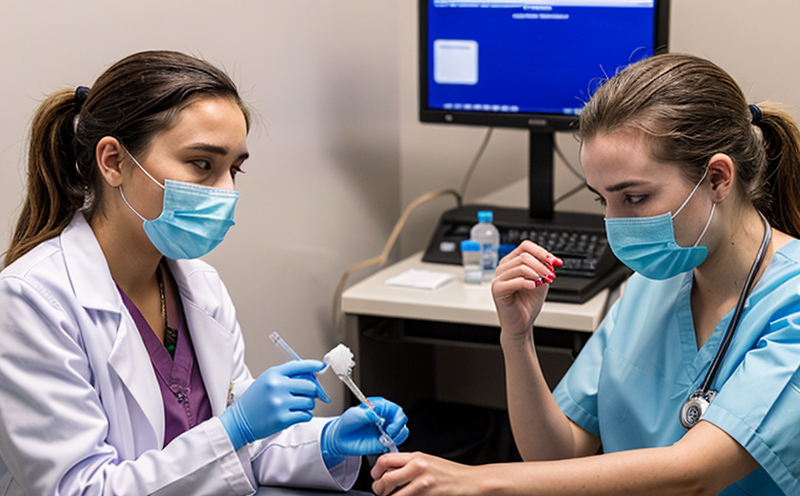ISO 13485 Medical Device Sterility & Microbiological Testing
The ISO 13485 standard is a cornerstone in quality management systems (QMS) specifically designed for the medical device industry. This internationally recognized standard ensures that organizations involved in the design, development, production, and distribution of medical devices maintain consistent quality throughout their operations. When it comes to ensuring sterility and conducting microbiological testing, compliance with ISO 13485 is not just a regulatory requirement but also a critical aspect of patient safety.
Microbiological testing plays a pivotal role in this context by providing scientific evidence that confirms the sterility claims made for medical devices. This service involves several key steps: sample collection, transport, preparation, and analysis using various microbiological methods. The aim is to ensure that all devices meet stringent sterility standards as defined by regulatory bodies such as the International Organization for Standardization (ISO).
The ISO 13485 standard emphasizes continuous improvement in processes, products, and services through rigorous quality management practices. This includes not only the production of sterile medical devices but also ensuring that all associated materials and processes are free from microorganisms capable of causing infections.
Our laboratory offers comprehensive microbiological testing services tailored to meet these stringent requirements. We employ state-of-the-art facilities equipped with advanced instrumentation, including laminar flow hoods, autoclave facilities, and high-performance liquid chromatography (HPLC) for sterility testing. Our team of experts is well-versed in the latest techniques and standards, ensuring accurate and reliable results.
The process begins with meticulous sample collection and transport to our laboratory using appropriate media and containers. Once received, samples undergo rigorous preparation steps which may include dilution or enrichment processes depending on the type of device being tested. Following this, specialized microbiological methods are applied such as membrane filtration, pour plate technique, or spread plate method.
It is important to note that these tests must be conducted under controlled conditions to ensure accurate results. We adhere strictly to international standards like ISO 13485 and follow Good Laboratory Practice (GLP) guidelines throughout the entire testing process. Compliance with these standards ensures confidence in our findings and supports regulatory approvals.
The outcomes of microbiological tests are critical for medical device manufacturers as they provide irrefutable evidence regarding the sterility status of their products. This information is then used by quality assurance departments to make informed decisions about product release, batch acceptance/rejection, and process optimization.
In summary, ISO 13485 medical device sterility testing involves a series of complex yet essential procedures aimed at ensuring that all devices meet strict sterility requirements. By adhering strictly to international standards and utilizing advanced technologies, we deliver reliable results that support both regulatory compliance and product quality assurance efforts.
Scope and Methodology
| Procedure | Description |
|---|---|
| Sample Collection | Collection of samples from various stages of manufacturing processes including raw materials, in-process intermediates, finished products. |
| Transport and Preparation | Proper transport conditions to maintain sample integrity followed by appropriate preparation methods such as dilution or enrichment cultures. |
| Microbiological Analysis | Use of various techniques like membrane filtration, pour plate method, spread plate technique for detection of microbial contaminants. |
The scope encompasses the entire lifecycle of medical device production where sterility is a critical factor. From raw materials to final products, every stage must be meticulously controlled and monitored. Our laboratory follows stringent protocols to ensure that each sample collected represents an accurate reflection of its source.
Transport conditions play a crucial role in maintaining the integrity of samples during transit from manufacturing sites to our lab facilities. We use specialized containers designed to preserve temperature stability which helps prevent any potential contamination or degradation before analysis can commence.
Apart from standard practices, we also offer customized solutions based on specific requirements set forth by clients. These could include additional controls for high-risk devices or enhanced validation procedures if needed.
Industry Applications
| Application Area | Description |
|---|---|
| Orthopedic Implants | Ensuring no viable bacteria or fungi are present in implants used during surgeries to minimize post-operative infections. |
| Catheters and Urinary Tract Devices | Testing for potential contamination which can lead to catheter-associated urinary tract infections (CAUTIs). |
| Blood Glucose Monitors | Verifying the sterility of sensors used in blood glucose meters to prevent cross-contamination. |
The application areas span across multiple sectors within healthcare, including orthopedics, cardiology, urology, and more. Each area has unique challenges regarding microorganisms that can cause harm if present in devices meant for direct contact with bodily fluids or tissues.
In orthopedic surgery, ensuring the sterility of implants is crucial to avoid post-operative infections which can be life-threatening complications. Similarly, catheters and urinary tract devices need rigorous testing due to their intimate relationship with body cavities where they introduce a risk factor for developing catheter-associated urinary tract infections (CAUTIs).
Blood glucose monitors also present specific challenges related to sensor sterility since these devices are often shared among patients within healthcare settings. Ensuring that no viable bacteria or fungi can be transferred through shared sensors helps maintain hygiene standards critical in preventing cross-contamination.
Our comprehensive testing services cover all stages of development, manufacture, and distribution ensuring that each device meets the highest level of quality and safety required by regulatory bodies worldwide.
Environmental and Sustainability Contributions
Incorporating sustainability into our operations is an integral part of our commitment to responsible environmental stewardship. By adhering strictly to ISO 13485 standards, we contribute positively towards reducing waste generation while enhancing overall efficiency within the manufacturing process.
The use of advanced technologies and methodologies allows us to minimize resource consumption without compromising on quality or accuracy. For instance, in our microbiological testing processes, we employ techniques that consume minimal amounts of chemical reagents which are often hazardous substances if not properly managed. <|im_start|> yans





